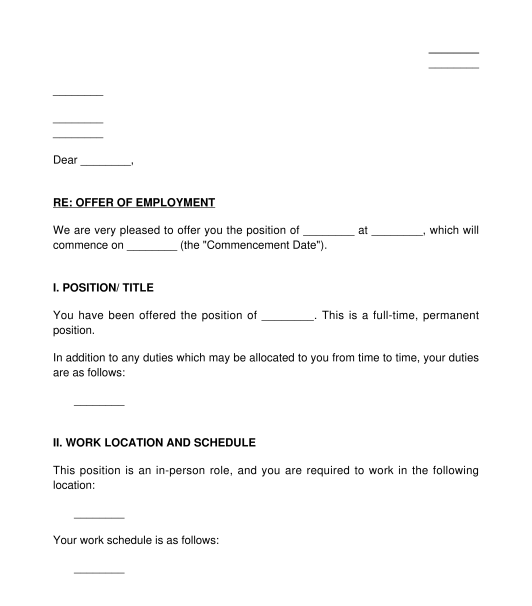 28/10/2025
28/10/2025

Answer a few questions and your document is created automatically.

Your document is ready! You will receive it in Word and PDF formats. You will be able to modify it.

 28/10/2025
28/10/2025
 Word and PDF
Word and PDF
 2 pages
2 pages



An employment offer letter, also known as a job offer letter is an official document an employer gives a job candidate who has been selected for employment.
It is a proposal for a job position and is provided after the employer has decided to hire the job candidate.
An employment offer letter is an offer or an invitation to enter into a contract. It indicates the employer's willingness to employ the job candidate upon the terms outlined in the employment offer. On the other hand, an employment agreement is a legal contract that regulates the employment relationship.
While both documents might contain similar provisions, the employment contract is more robust and comprehensive than the employment offer.
There are several employment agreements. Here are the most common types:
It is important to note that employment contracts can often combine elements of different types of contracts. For instance, an employment agreement might be for a part-time fixed-term position or a full-time permanent position.
An employer offer letter is provided to only persons who are hired to work as employees. On the other hand, engagement letters are provided to independent contractors or service providers.
In an employment relationship, the employer controls how the employee performs their job. Employees also receive statutory benefits and protections, such as insurance and pension benefits, annual holidays, etc. The employer also handles tax withholdings and social security contributions.
On the other hand, service providers or independent contractors have control over how the work is done. Additionally, contractors do not receive employee benefits and are responsible for their taxes.
For more information, see our legal guide "What's the Difference Between an Employee and an Independent Contractor?".
No, an employment offer is not mandatory. However, an employment offer letter is an essential document provided to a job candidate as it indicates the employer's interest in hiring the job candidate.
An employment offer letter can be concise or as robust as possible. Nevertheless, a standard employment offer letter must contain basic terms or provisions, such as the following:
The law strictly regulates employment relationships. Hence, among other points, it is not permitted to:
The parties to an employment offer letter are the employer (who hires a person to work) and the employee (a person who is hired for a job).
Generally, an employee can be any individual of 18 years old or older, who has the right to legally reside in Nigeria.
Under the law, a child and young persons under the age of 15 may work but there are strict rules regulating the employment of a minor. Generally, a child cannot work except when they are employed to do light work. Additionally, young persons below the 15 will require parental consent to work.
An employer should be a national or international organization based and officially registered as a legal entity in Nigeria.
An employment agreement cannot be used in a situation when an employee is less than 18 years old.
In cases where a minor is hired, the employer must comply with the rules and obtain the consent of their parent or guardian.
Like an employment agreement, the employer and employee decide on the duration of the employment. The parties can choose an indefinite period or a fixed term.
The employment offer letter should be signed by both parties in two original copies. The employment offer letter can be signed in person or electronically. If the employer is an organization, an officer (a representative of the organization such as the director, partner, human resources manager, etc.) will sign on behalf of the organization.
The employer should deliver two copies of this letter (either by hand or via email) to the job candidate. If the job candidate accepts the job offer, the job candidate is required to sign two copies of the employment offer and return at least one copy of the document as a formal acceptance of the employment. The signature of the job candidate (employee) signifies acceptance, which becomes binding on both parties. After signing, each party should keep one signed copy for their record.
Note that if the job candidate accepts the employment offer, the employer is required by law to deliver an employment contract within three months from the date of employment.
However, if the applicant declines the offer, he or she can send a rejection letter to the employer instead.
In some cases, the following documents may be attached to the employment offer letter:
No, it is not necessary to notarize an employment offer letter. Signatures of the parties and witnesses are sufficient.
The employment offer letter needs to be witnessed to be valid. The witness should be someone who is at least 18 years of age.
After the parties have signed, the document must be witnessed by at least one person. The witness must hand fill in their names, addresses, and occupations and sign the document.
No costs are associated with the finalization of an employment offer letter.
Employment and employment offer letters are subject to Federal laws as issues relating to employment and labour matters in Nigeria are within the exclusive purview of the federal legislature. The Federal laws applicable to this agreement include:
You fill out a form. The document is created before your eyes as you respond to the questions.
At the end, you receive it in Word and PDF formats. You can modify it and reuse it.
Guides to help you
Employment Offer Letter - FREE - sample template
Country: Nigeria